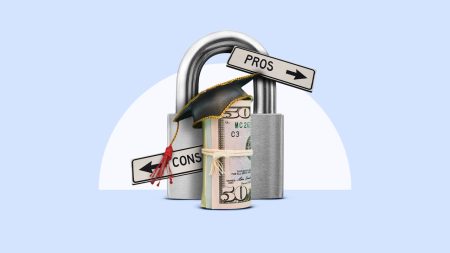Thirawatana Phaisalratana / Getty Images
Key takeaways
- Even without a job, you can generally get an emergency loan if you can prove a reliable source of income, such as disability benefits or a spouse’s income.
- Lenders that offer loans without proof of income are probably predatory.
- If you have a low credit score or high debt-to-income ratio, you could face high fees and be more likely to default.
- If you do not have a steady income, look into loan alternatives like assistance programs, repayment plans or help from family and friends.
If you’re facing financial hardship but don’t have a job, you may still qualify for an emergency loan. Lenders care more about your ability to repay the loan than your employment status. That means if you can show a reliable income source, such as disability benefits, spousal income or side gigs, you might still be eligible for an emergency loan.
In addition to income, lenders also assess your credit score and debt-to-income (DTI) ratio when evaluating your application. If you have a pending employment opportunity, the lender may also accept an offer letter if the start date is within a certain timeframe.

The art of the side hustle
Want to learn more about side hustles and how it can fill those financial gaps? Senior writer Denny Ceizyk shows how side hustles build financial resilience and has some encouraging words for anyone who wants to try.
Learn more
Income sources your lender may accept
- Social Security or disability benefits
- Unemployment benefits
- Alimony or child support
- Spouse’s income
- Pension or retirement income
- Recurring interest or dividends from savings or stocks
- Rental income
- Royalties
- Freelance income
- Contract work
Eligibility requirements for emergency loans if you don’t have a job
Emergency loans are short-term personal loans that are typically used to cover urgent, unexpected expenses – like medical bills, car repairs or emergency travel. Because of their urgency, lenders may be more flexible with employment criteria, especially if you have other qualifying factors.
Credit score
Some lenders offer emergency loans for borrowers with bad credit, but they may charge annual percentage rates (APR) that are over 600 percent. Also known as payday loans, this type of predatory financing can leave you facing a debt cycle that can put even more strain on your budget the next time you face an emergency. If you fit into this category and have an urgent financial need, explore payday loan alternatives instead.
If you have a good to excellent credit score:
- You may qualify for other types of personal loans with lower APRs
- Approval is faster and often requires less documentation
Debt-to-income ratio (DTI)
Lenders like to see that your debt-to-income ratio (DTI) is below 50 percent. If they believe you have insufficient income to take on additional loan payments or if you have several credit cards as well as other personal loan debt, you could be denied funding.
Additional emergency loan requirements if you don’t have a job
Some lenders may require extra assurances to approve your application.
Collateral
Offering collateral for your loan— like a car or savings account — can help you qualify for a secured emergency loan. However, this means the lender can seize your asset if you default.
Before agreeing to use collateral:
- Understand the risks. Losing a vehicle or home could create deeper financial trouble.
- Make sure both parties understand the terms and ramifications.
6 Steps to getting an emergency loan without a job
Here’s a simplified process to help you apply for an emergency loan without employment:
Step 1: Research eligibility requirements
Check each lender’s requirements — some accept alternative incomes or have no minimum credit score.
You should also review your credit report to confirm its accuracy and file disputes if you spot issues. Nearly half (44 percent) of those who review their credit reports find mistakes, according to Consumer Reports. Errors on your credit report can drag down your score.
Importance of credit score and DTI
Your credit score and DTI ratio heavily influence your approval odds and loan terms, so it’s worth checking your credit score to know where you stand before applying.
Step 2: Get prequalified with many lenders
Prequalification won’t hurt your credit and gives you a preview of potential terms. Compare banks, credit unions and online lenders to see which is the best fit.
- Online lenders: These lenders are a good option if your priority is fast funding or if you have fair or less-than-perfect credit, as they tend to offer more flexibility.
- Credit union: Your local credit union is also worth considering if you’re a member and your credit score is on the lower end.
- Bank: If you have excellent credit, doing business with a bank you have an existing relationship with could land more favorable terms.
Be sure to get prequalified with at least three lenders. In most cases, the process can be completed online and takes just a few minutes.
Step 3: Compare offers
Pay attention to projected APRs, fees and monthly loan payments of each lender. If the lender offers any special perks, keep those in mind as well. The funding timeline is also important since you need cash much sooner rather than later to cover the financial emergency.
Step 4: Gather information and documentation
In the meantime, start gathering information and documentation the lender will need when you apply to avoid processing delays, such as the following:
- Proof of identity
- Proof of address
- Proof of income
- Bank account information
Step 5: Submit an application
Apply with your chosen lender and submit the necessary documentation promptly. Most lenders accept online applications, but a phone number is typically available for assistance.
Don’t keep your underwriting team hanging
If the loan officer or underwriting team needs more information from you, be sure to respond to their requests promptly. Keep in mind that each formal application results in a hard credit inquiry that slightly dings your credit score.
Step 6: Sign the loan agreement
Read the terms carefully. Ask questions before signing. Funds typically arrive into your account within one to seven business days.
Emergency loan alternatives
Emergency loans often come with high costs and short repayment periods. Consider these safer alternatives first:
- Talk to your creditors: Negotiate a payment plan or payment extension.
- Seek help from local nonprofits: Call 211 to get connected to food, utility or rent aid.
- Apply for an emergency credit card: It may be difficult without a job, but you may still be able to qualify with a regular source of income. And they can help you avoid borrowing a large amount if you only need a few hundred dollars.
- Borrow from family or friends: Proceed with caution when taking this route. Bankrate loans writer Brittany Howard says, “Borrowing from family and friends can be tricky. If you go that route, treat it professionally and write down terms that you can both agree to – and then stick to them.”
Bottom line
If you decide an emergency loan is the right decision, take the time to compare emergency loan rates before you apply. As long as you have a reliable source of income, you should be able to find emergency loans with no job. Be sure to consider the alternatives to avoid paying high interest, especially if finances are already tight.
Frequently asked questions
Why we ask for feedback
Your feedback helps us improve our content and services. It takes less than a minute to
complete.
Your responses are anonymous and will only be used for improving our website.
Help us improve our content
Read the full article here









